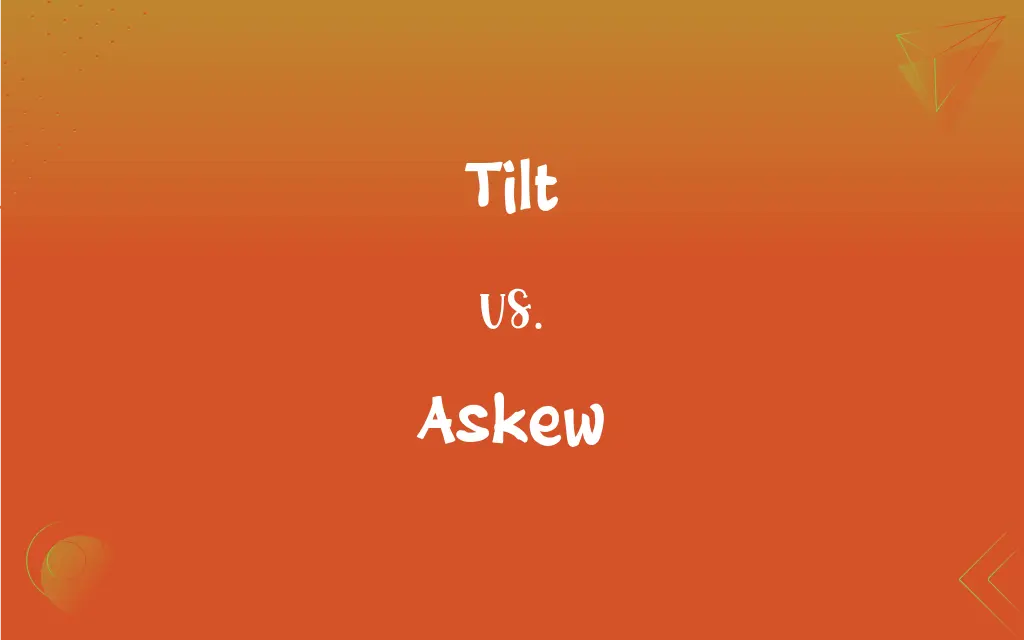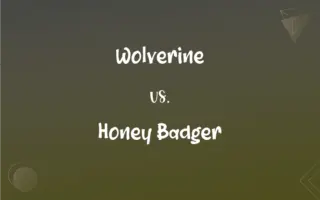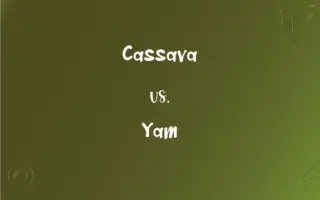Tilt vs. Askew: What's the Difference?
Edited by Harlon Moss || By Janet White || Published on October 17, 2023
"Tilt" refers to moving something into a sloping position, while "askew" describes something that is not straight or is off-center.

Key Differences
Tilt" generally conveys the action or state of leaning or angling an object or surface from its original position. In contrast, "askew" is an adjective that characterizes something as being out of alignment, crooked, or not straight.
When something is set at an angle intentionally or by force, it is said to "tilt." On the other hand, when something appears twisted, lopsided, or not level, it can be described as being "askew."
The act of tilting can be deliberate, such as tilting a camera to capture a unique angle. "Askew" implies an unintended deviation from the expected straightness or level, like a picture hanging unevenly on a wall.
"Tilt" can also refer to a tendency or bias in certain contexts, whereas "askew" consistently denotes an uneven or misaligned state or appearance.
Both words can be used in various contexts, but their fundamental difference lies in "tilt" being more action-oriented and "askew" being more descriptive of a state or appearance.
ADVERTISEMENT
Comparison Chart
Nature
Verb (primarily)
Adjective (primarily)
Meaning
To cause to lean or slope.
Not in a straight or level position.
Intent
Can be intentional or unintentional.
Typically unintentional.
Contextual Use
Can indicate bias or preference in some cases.
Does not imply bias, only misalignment.
Example
"She tilted her head."
"The painting hung askew."
ADVERTISEMENT
Tilt and Askew Definitions
Tilt
A sloping position or movement.
The tilt of her hat gave her a mysterious look.
Askew
Not in a straight or level position.
The sign was slightly askew.
Tilt
A sudden feeling of vertigo or dizziness.
She felt a sudden tilt and had to sit down.
Askew
Awry or amiss.
His plans went askew.
Tilt
To cause to slope, as by raising one end; incline
Tilt a soup bowl.
Tilt a chair backward.
Askew
Out of alignment.
The door was hung askew and wouldn't close properly.
Tilt
To cause to be advantageous to one party rather than another
A development that tilted the balance of trade in their favor.
Askew
With a slant or tilt.
He wore his hat askew.
Tilt
To aim or thrust (a lance) in a joust.
Askew
Crookedly; obliquely.
The rug lay askew on the floor.
Tilt
To charge (an opponent); attack.
Askew
To one side or out of proper alignment; awry
Rugs lying askew.
Tilt
To forge with a tilt hammer.
Askew
Turned or twisted to one side.
Tilt
To slope; incline
The field tilts toward the river.
Askew
(figuratively) Untoward, unfavourable.
Tilt
To have a preference, favor, or be inclined toward something
She recently tilted toward vegetarianism.
Askew
Tilted to one side.
He wore his hat askew
Tilt
To be advantageous to one side over another, as in a dispute
"The battle ... was beginning to tilt again in the Confederates' favor" (Stephen W. Sears).
Askew
Awry; askance; asquint; oblique or obliquely; - sometimes indicating scorn, or contempt, or entry.
Tilt
To fight with lances; joust.
Askew
Turned or twisted toward one side;
A...youth with a gorgeous red necktie all awry
His wig was, as the British say, skew-whiff
Tilt
To engage in a combat or struggle; fight
Tilting at injustices.
Askew
Turned or twisted to one side;
Rugs lying askew
With his necktie twisted awry
Tilt
To cover (a vehicle) with a canopy or an awning.
Tilt
The act of tilting or the condition of being tilted.
Tilt
An inclination from the horizontal or vertical; a slant
Adjusting the tilt of a writing table.
Tilt
A sloping surface, as of the ground.
Tilt
A tendency to favor one side in a dispute
The court's tilt toward conservative rulings.
Tilt
A preference, inclination, or bias
"pitilessly illuminates the inaccuracies and tilts of the press" (Nat Hentoff).
Tilt
A medieval sport in which two mounted knights with lances charged together and attempted to unhorse one another.
Tilt
A thrust or blow with a lance.
Tilt
A combat, especially a verbal one; a debate.
Tilt
A tilt hammer.
Tilt
New England See seesaw.
Tilt
A canopy or an awning for a boat, wagon, or cart.
Tilt
(transitive) To slope or incline (something); to slant.
Tilt the barrel to pour out its contents.
Tilt
(intransitive) To be at an angle.
Tilt
To charge (at someone) with a lance.
Tilt
(transitive) To point or thrust a weapon at.
Tilt
(transitive) To point or thrust (a weapon).
Tilt
To forge (something) with a tilt hammer.
To tilt steel in order to render it more ductile
Tilt
To intentionally let the ball fall down to the drain by disabling flippers and most targets, done as a punishment to the player when the machine is nudged too violently or frequently.
Tilt
To play worse than usual (often as a result of previous bad luck or losses).
Tilt
(transitive) To cover with a tilt, or awning.
Tilt
A slope or inclination.
Tilt
The inclination of part of the body, such as backbone, pelvis, head, etc.
Tilt
(photography) The controlled vertical movement of a camera, or a device to achieve this.
Tilt
A jousting contest. (countable)
Tilt
An attempt at something, such as a tilt at public office.
Tilt
A thrust, as with a lance.
Tilt
A tilt hammer.
Tilt
A canvas covering for carts, boats, etc.
Tilt
Any covering overhead; especially, a tent.
Tilt
A covering overhead; especially, a tent.
Tilt
The cloth covering of a cart or a wagon.
Tilt
A cloth cover of a boat; a small canopy or awning extended over the sternsheets of a boat.
Tilt
A thrust, as with a lance.
Tilt
A military exercise on horseback, in which the combatants attacked each other with lances; a tournament.
Tilt
See Tilt hammer, in the Vocabulary.
Tilt
Inclination forward; as, the tilt of a cask.
Tilt
To cover with a tilt, or awning.
Tilt
To incline; to tip; to raise one end of for discharging liquor; as, to tilt a barrel.
Tilt
To point or thrust, as a lance.
Sons against fathers tilt the fatal lance.
Tilt
To point or thrust a weapon at.
Tilt
To hammer or forge with a tilt hammer; as, to tilt steel in order to render it more ductile.
Tilt
To run or ride, and thrust with a lance; to practice the military game or exercise of thrusting with a lance, as a combatant on horseback; to joust; also, figuratively, to engage in any combat or movement resembling that of horsemen tilting with lances.
He tiltsWith piercing steel at bold Mercutio's breast.
Swords out, and tilting one at other's breast.
But in this tournament can no man tilt.
The fleet, swift tilting, o'er the urges flew.
Tilt
To lean; to fall partly over; to tip.
The trunk of the body is kept from tilting forward by the muscles of the back.
Tilt
A combat between two mounted knights tilting against each other with blunted lances
Tilt
A contentious speech act; a dispute where there is strong disagreement;
They were involved in a violent argument
Tilt
A slight but noticeable partiality;
The court's tilt toward conservative rulings
Tilt
The property possessed by a line or surface that departs from the vertical;
The tower had a pronounced tilt
The ship developed a list to starboard
He walked with a heavy inclination to the right
Tilt
Pitching dangerously to one side
Tilt
To incline or bend from a vertical position;
She leaned over the banister
Tilt
Heel over;
The tower is tilting
The ceiling is slanting
Tilt
Move sideways or in an unsteady way;
The ship careened out of control
Tilt
Charge with a tilt
Tilt
To move or cause to move into a sloping position.
He tilted the mirror towards him.
Tilt
A jousting contest between knights.
The knights prepared for the tilt.
Tilt
To incline or bias in opinion.
The news article had a tilt towards a particular viewpoint.
FAQs
Is "askew" always unintentional?
Typically, but it can be used stylistically to describe intentional misalignment for effect.
Can "tilt" be used as a noun?
Yes, "tilt" can refer to a sloping position or a jousting contest.
Can a camera be tilted?
Yes, tilting a camera can achieve a unique shot or angle.
Can you "tilt" your perspective?
Yes, in a metaphorical sense, it can mean to adjust or change one's viewpoint.
Can a person's opinion be "askew"?
Not typically. "Tilt" is better suited to describe bias or inclination in opinion.
Is "tilt" always visible?
No, "tilt" can be metaphorical, indicating bias or a tendency.
Can "tilt" describe a physical sensation?
Yes, it can refer to a feeling of dizziness or vertigo.
Can an object be both tilted and askew?
Yes, an object can be intentionally tilted and still appear askew if not aligned properly.
Can "askew" describe someone's emotions?
While less common, it can metaphorically describe someone feeling out of sorts.
Does something askew always need fixing?
Not necessarily; it can be a stylistic choice or not bothersome enough to correct.
Does "askew" only refer to physical objects?
Mostly, but it can describe any situation or thing that's off or not as expected.
How does "askew" relate to "awry"?
Both can describe something not straight or amiss, but "awry" often implies a larger deviation or problem.
Is "tilting" always a bad thing?
No, it can be a deliberate action or simply a way to describe an angle.
Can landscapes tilt?
In descriptive writing, landscapes can be depicted as tilting, especially in conveying a certain viewpoint or angle.
Is "askew" a formal term?
It's neutral and can be used in both formal and informal contexts.
About Author
Written by
Janet WhiteJanet White has been an esteemed writer and blogger for Difference Wiki. Holding a Master's degree in Science and Medical Journalism from the prestigious Boston University, she has consistently demonstrated her expertise and passion for her field. When she's not immersed in her work, Janet relishes her time exercising, delving into a good book, and cherishing moments with friends and family.
Edited by
Harlon MossHarlon is a seasoned quality moderator and accomplished content writer for Difference Wiki. An alumnus of the prestigious University of California, he earned his degree in Computer Science. Leveraging his academic background, Harlon brings a meticulous and informed perspective to his work, ensuring content accuracy and excellence.








































































